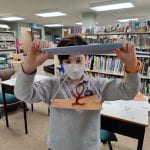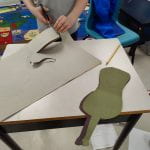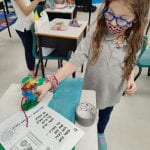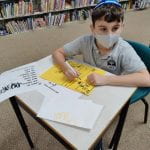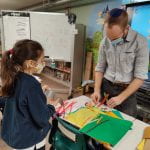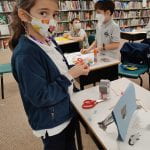GUEST BLOGGERS: Introducing Yaara and CP31 ‘OUR JK and Grade 4 Shabbat celebrations”
Today we have student guest bloggers Yaara and CP31 sharing the Shabbat Celebrations with the JK class. Thank you to Morah Yulia and Morah Susan for facilitating and planning this!
ENJOY!
Introduction
Hey mystery bloggers here today we will tell you about JK and gr.4 shabbat together.
Tefilla
Last time we where together We did tefilla In our classroom and before we did Shabbat songs in their classroom .
Here is a list of some of the songs and tefilla we did.
-
271/שלום עליכם
-
404/אין כאלהינו
-
268 / אדון עולם
-
222/ לכו נרה
-
265 / עלינו
Heads up not all of them are there and not in order.
Upcoming holiday activates
The next holiday coming up is passover and we did a kahoot about it and the JKs are very smart.
For Purim the JKs did a puppet show for us in their classroom it was amazing.
here are more photos of the kahoot.
Songs
When we were in their class they showed us some of the songs they like for shabat.
Bye have a good week.
Grade 4 Newsletter
Grade 4 Model Seder 2023
Morah Dana led Grade 4 in a beautiful model Seder yesterday. Students threaded the Seder with songs about Pesach! Check out the recording’s here!
Hebrew Reading Buddies – Hanukkah week!
Summer choice borad
If you want during the summer to listen to music, read stories, hear the Torah portion of the week, and practice topics we have learned, a choice board is attached!
Have a fun break everyone🤸
Morah Dana
https://docs.google.com/presentation/d/1eqtWv9k3P04P0DvxQsH2pltkIjxupCSzyr-WZwq-hSs/edit#slide=id.p
Winter Break and More
Dear parents,
Before I begin, I would like to thank everyone for the warm welcome I received from both parents and kids. It was heartwarming and delightful. As we are entering our winter break, I would like to take this opportunity and connect with you once again about some of the things we did in class in the last couple of weeks.
Since my arrival, we introduced a new morning routine in which we start each day with ten minutes of reading. The children are now exposing themselves to many new aspects of the Hebrew language such as “shtuzim” which are unique joke-rhymes and cultural cornerstones of Israeli culture such as “Aye Pluto”, “Kofiko” and more. When we come back from the break, we will start looking at Hebrew books that are available in our library for students to be reading during that block of time.
Additionally, we have finished presenting our food projects which were absolutely amazing. The kids learned so much about their favourite foods, their history and the important place food has in one’s own heritage and identity. In the spirit of sharing, Hamoreh Saar even started making some of the recipes at home, fish & chips, chilli, pickles, Challah and the list goes on.
In the last week we started learning about Israel’s national Poet; Chaim Nachman Bialik. We introduced some of his most famous poems such as “Nadneda”, “Makhelat noganim” & “Ken latzipor”. The kids even started making crafty crafts to embody different aspects of the poems.
For winter break, the children will receive reading pages. These pages are optional. After winter break, we will start to work more intensely on the Hebrew calendar, how it differs from the Gregorian calendar and why, alongside the timing of our holidays, birthdays and major events during the year.
Thank you again for your support, and should you have any questions feel free to email me.
Happy winter break,
Dana
Instructions for November’s final project
Dear parents, as you already know, this months’ project is on the topic of food. Today we explained to the students how they should start working on their food related project. While all of the explanations were given in class, we feel that the best results will be achieved if you guys are onboard. The following are the outlines of the entire project as they were given to the kids:
- The entire duration of the presentation must be under 5 minutes. Should you need more, ask one of the teachers and explain why.
- All presentations must include as much Hebrew as possible, each student is expected to include content in Hebrew in accordance to their own ability.
- The topic of the project is a food that has some special meaning to you and your family members. It doesn’t have to be traditionally Jewish/Israeli, but it would be better if it was.
- The kids can pair up, no more than two in a group. If they work as a duo, they can do a presentation about the same food, or two separate presentations, their choice.
- The presentation must contain the answers for the following questions:
- What food did you choose? ( I chose to do my project about Hummus)
- Why did you choose it? Or why does this food mean something to you and your family members? (My bubby used to make my mom latkes on rainy days, my mom makes me latkes on rainy days, so every rainy day I think about latkes, and so on.)
- What is the history of this food in general, and what is its history within your family? (for example: Chumentash symbolizes Haman harasha’s ears, they come from ancient Persia, my zeidi always brought us a box of Chumentash on Purim)
- What is it made of? Where can you find the food itself? (grocery stores, in the wild, restaurants, etc.)
- After gathering the information from the question above, the kids will have to decide on a method of delivery for their project, this is the part where they get to be as original as they can. Just off the top of my head, they could do:
- A presidential debate between two politicians arguing which food should be the national food? Couscous or Burekas?
- A skit about a Canadian going to an Israeli restaurant asking what’s in every dish.
- A slide show about the food the kid chose.
- A large plack with cutouts, texts and pictures on it.
- A news article covering a huge accident on the Ottawa river causing a mass spill of lucky charms into the lake.
- The sky’s the limit, any idea the kids have that cover all the materials gathered in the last section is perfect.
- The presentations need to be ready for the week of 29.11-3.12, we won’t have all presentations done in a row, but will spread them out throughout the week. We’ll give each student a more specific date after reviewing their progress at the end of next week.
- Have fun, push your kids to explore your background and culture, inspire them to be as imaginative as they can!!!
Jewish studies during October
Hello dear parents ,
Another month of learning is almost behind us. This month we managed to learn a lot and even though remote studying isn’t always easy (for all of us). We managed to enter a proper school routine and the children are working hard, as well as learning the importance of facing difficulties in learning a second language. In September, which was full of holidays, we learned and got to know phrases and words for each holiday. Later we learned about Eliezer Ben Yehuda and his contribution to the Hebrew language. We also learned about the seasons, autumn in particular, and their characteristics. We also learned about verbs in the past tense and how they can be adapted to the correct pronouns. Each student is given an assessment and each of them is placed in the appropriate level group so that they can study according to their level. In addition, we study prayer, Torah and Parshat Hashavua.
Next month, the Israeli-Jewish personality of the month will be Yitzhak Rabin and the theme of the month will be foods. This month we are doing a food project with the kids that aims to accomplish two goals: Firstly, establishing a solid vocabulary and verbal conversation abilities that the children could use in everyday life (in places such as restaurants, markets, grocery stores and even at home). Secondly, connecting the kids to their Jewish heritage through their stomachs. Starting from their own home, we will slowly expose them to the different types of cuisine common in different ethnical groups within the extremely broad Jewish community. We distributed to the children pages with a partial list of popular foods (in English, Hebrew and accompanied by pictures), the children must fill each day with 5 food items that they ate that day. We would like to ask you the parents to take an active role in the childrne’s Jewish studies and encourage them to present to you what they learn in class. Encourage them to become interested in their own background by speaking with them about the kinds of food your family enjoys.
We thank and wish you a good day,
Hamorah Dana and Hamoreh Saar.
